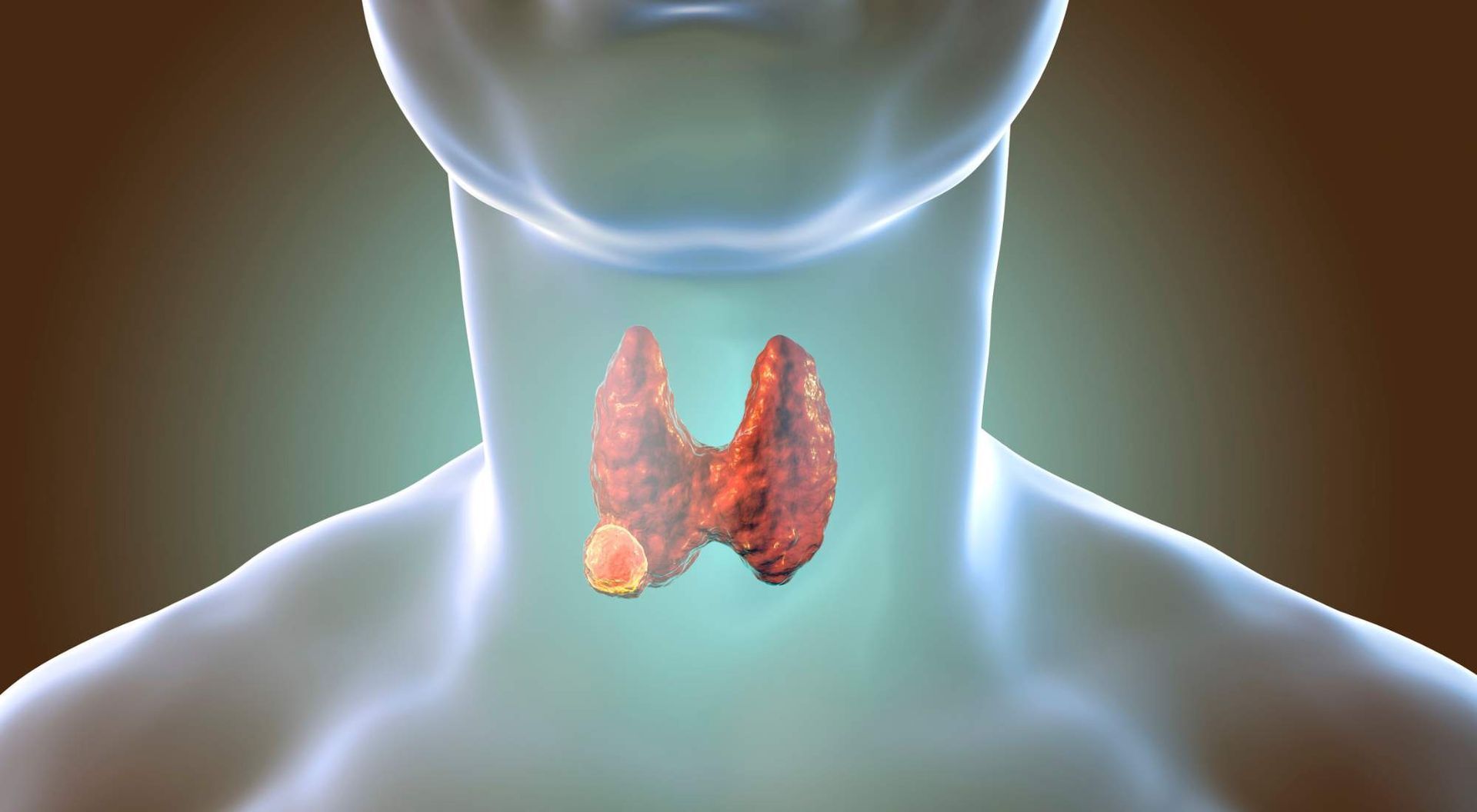Thyroid Disease and Memory Loss: Is There a Connection?
"The content below is not intended to be a substitute for professional medical advice, diagnosis, or treatment. Always seek the advice of your physician or other qualified health provider with any questions you may have regarding a medical condition."
Memory loss, brain fog, and just feeling ‘out of it.’ Some days, you wonder if you’ll ever be able to think straight again.
The truth is, if you’re experiencing these symptoms, your thyroid disease may be to blame.
In this article, we dive into the relationship between thyroid disease, memory loss, and other cognitive impairments and how holistic nutrition may be a key to rejuvenating your memory.
Table of Contents
Can Thyroid Disease Cause Memory Loss?
Yes, some thyroid disorders can cause memory loss and dementia-like symptoms.
Studies have shown that certain thyroid disorders, like hypothyroidism, can impact brain function. This can cause memory loss, cognitive slowing, and other symptoms called ‘brain fog’ that are similar to dementia.
Sound familiar? If these symptoms sound like a diary entry, it might be time to consider your thyroid health.
Book a consultation with HealthierU for
hypothyroidism treatment in Brooklyn.
What Does Thyroid-Induced Memory Loss Look Like?
Unsure if your brain fog is caused by thyroid issues? Here are some common symptoms of thyroid-induced memory loss:
- Fatigue, sleepiness, and low energy, even after a full night’s sleep
- Forgetfulness, such as misplacing objects and forgetting important dates
- Persistent confusion
- Difficulty making simple decisions
- Certain psychological symptoms, such as:
- Mood instability
- Depression
- Free-floating anxiety
- Difficulty focusing and concentrating (this is where the term brain fog comes from, as it causes you to feel ‘lost in the fog’)
If you are experiencing any of these symptoms, visit your healthcare practitioner. You can also consider holistic thyroid treatment from
HealthierU in Brooklyn, NY.
Can Memory Loss Induced by Thyroid Dysfunction Be Reversed?
Unlike dementia, memory loss and other cognitive problems brought on by thyroid issues are often reversible.
Many patients find that memory loss and brain fog associated with thyroid disorders may be reversed once they receive a diagnosis and treatment. However, this change won’t happen overnight and symptoms may take several months to recede.
Nutritional support and holistic healthcare may help this process. If you are curious about how holistic nutrition and chiropractic care can
help, Contact HealthierU for a free consultation.
Does Having Thyroid Disease Increase Your Chances of Developing Dementia?
The link between dementia diagnosis and thyroid problems is still tentative — doctors and researchers are not sure if hyperthyroidism or hypothyroidism is a cause of dementia, or a comorbidity brought on by aging.
Some studies suggest a link between hyperthyroidism and an increased risk of dementia, while other studies claim no clear link between the two. Currently, there is no scientific evidence to show that correctly treated thyroid problems are a long-term risk for dementia.
Untreated thyroid conditions may mimic symptoms of early dementia, such as memory loss, slight cognitive decline, brain fog, and mood swings. However, unlike dementia, these symptoms will eventually lessen with thyroid treatment.
Beyond Memory Problems: 6 Cognitive Impairments Thyroid Disease May Trigger
The thyroid and the endocrine system greatly impact brain functioning. These glands create chemicals that allow the body to speak to the brain and vice versa. If the thyroid is not functioning as well as it should, it can cause several cognitive issues.
#1: Difficulty Concentrating
We all experience difficulty concentrating sometimes, such as during a boring math class or at the end of a long workday. But If you feel like you have a hard time concentrating all the time, especially if it prevents you from completing basic tasks, it could be related to your thyroid.
Thyroid disorder can cause difficulty concentrating by impacting hormone reactions in the brain. Simply put, hormones help the body communicate with the brain.
One
study suggests the cause of memory loss in thyroid problems is a lack of thyroid hormones, which causes decreased blood flow to the hippocampus. The hippocampus is the part of the brain responsible for attention, working memory, and motor speed. If it is not getting all it needs, you could be left with difficulty concentrating.
#2: Brain Fog
Brain fog doesn’t describe one particular symptom, but represents a collection of cognitive impairments that make day-to-day life difficult. These include:
- Confusion
- Fatigue
- Slow thought process
- Not having the right words
Having brain fog can make it feel harder to respond to stimuli, and leave you feeling less mentally ‘sharp.’ Brain fog is a common symptom of dysregulated hormones caused by thyroid and endocrine disorders.
#3: Decline in Executive Functioning
Executive functioning is the ability to swiftly decide what tasks need to be done and carry them out. People with certain disorders, such as severe ADHD, anxiety, and depression, struggle with executive functioning.
Some studies show that a poorly functioning thyroid can impact executive functioning, making it difficult for individuals to get through their day. For the elderly, this can be distressing, as it imitates the onset of dementia.
The decline in executive functioning is related to the hormones in the hippocampus of the brain, which are controlled by the thyroid. Poorly functioning hormones can lead to decreased blood flow, causing diminished function that affects decision-making.
#4: Slower Reaction Times
Do you feel like you are moving through mental quicksand? It could be your thyroid.
If your thyroid isn’t properly functioning, you could be experiencing decreased reaction times due to a slowed metabolic rate. Like a computer with a bad connection to the internet, it could feel like your thoughts and responses are taking longer to ‘load’ than normal.
This impacts not only your mental reaction times but also your physical reactions. People with untreated thyroid disorders often report slower reflexes and a general feeling of being ‘out of it.’
#5: Decreased Spatial Organization
Spatial organization is the ability to identify your body in relation to your surroundings. It allows us to do many tasks we take for granted, such as navigating obstacles in our path —like a set of stairs or a hot mug of coffee on the edge of a countertop.
If you are suffering from an untreated thyroid condition, you may experience a decrease in spatial organization.
This is due to a slowed metabolism and impacted brain activity caused by a lack of hormones. One
study showed that both an overactive and an underactive thyroid resulted in a slower gait and lack of spatial awareness. This can be dangerous to the elderly, as it increases the likelihood of a fall.
#6: Depression and Anxiety
We now know that thyroid disorders can impact a lot of brain functions, from the ability to focus to spatial awareness and walking. But did you know that thyroid disorders have also been shown to increase or cause depression and anxiety?
According to studies on the impact of thyroid function on mental health, how a patient’s mental health changes depends on what kind of thyroid disorder is present.
If you have hyperthyroidism, overactive thyroid, you may have mental health symptoms related to the flooding of hormones in your brain. This may look like:
- Anxiety
- Irritability
- Trouble falling asleep/staying asleep
- General nervousness
However, if you have hypothyroidism, an underactive thyroid, you may experience different mental health effects, including:
- Persistent exhaustion, even after a good night's sleep
- Depression
There may also be other conditions that contribute to mental health changes. If you feel your mental health is being impacted by your thyroid, talk to your doctor and consider holistic treatment options, like the ones offered by HealthierU in Brooklyn, NY.
How To Treat Cognitive Impairment and Memory Loss Caused by Thyroid Disease
Worried you are experiencing cognitive impairment or memory loss related to thyroid disease? Don’t panic. Although these symptoms can be scary, you don’t have to live with them.
At HealtheirU, we believe your body knows what is wrong with it. Instead of the cookie-cutter thyroid treatments often found in traditional medicine, we offer comprehensive testing and nutritional guidance to help support your thyroid.
We believe in working with your body to help it heal itself.
HealthierU: Learn How You Can Address Your Thyroid Disease and Live a Healthier Life With a Holistic Nutrition Plan
If you are struggling with memory loss caused by thyroid disease, HealthierU can offer a holistic alternative.
Through scientific testing, we offer holistic nutrition plans that help support your thyroid, improving symptoms of hypo and hyperthyroidism.
With a holistic nutrition plan from HealthierU, you get diet guidelines as well as whole food supplements and exercise techniques designed to restore thyroid function and hormone balance.
Reach out to HealthierU today and schedule your free nutrition consultation to learn more.






